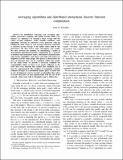Averaging algorithms and distributed anonymous discrete function computation
Author(s)
Tsitsiklis, John N.
Downloadmed.pdf (116.5Kb)
OPEN_ACCESS_POLICY
Open Access Policy
Creative Commons Attribution-Noncommercial-Share Alike
Terms of use
Metadata
Show full item recordAbstract
In distributed consensus and averaging algorithms, processors exchange and update certain values ("estimates" or "opinions") by forming a local average with the values of their neighbors. Under suitable conditions, such algorithms converge to consensus (every processor ends up holding the same value) or even average-consensus (consensus is achieved on the average of the initial values held by the processors). We first review some convergence rate results. We then abstract the problem by introducing a model of deterministic distributed function computation by a network of identical and anonymous nodes, with limited communication and storage capabilities, and where each node only knows its neighbors, not the entire graph. Our goal is to characterize the class of functions that can be computed within this model. In our main result, we provide a necessary condition for computability which we show to be nearly sufficient, in the sense that every function that satisfies this condition can at least be approximated. The problem of computing (suitably rounded) averages in a distributed manner plays a central role in our development, and we provide an algorithm that solves it in time that grows at most quadratically with the size of the network. (Joint work with J. Hendrickx and A. Olshevsky).
Date issued
2011-06Department
Massachusetts Institute of Technology. Department of Electrical Engineering and Computer ScienceJournal
Proceedings of the 2011 19th Mediterranean Conference on Control & Automation (MED)
Publisher
Institute of Electrical and Electronics Engineers (IEEE)
Citation
Tsitsiklis, John N. Averaging Algorithms and Distributed Anonymous Discrete Function Computation. In 2011 19th Mediterranean Conference on Control & Automation (MED), 301-302. Institute of Electrical and Electronics Engineers, 2011.
Version: Author's final manuscript
ISBN
978-1-4577-0124-5